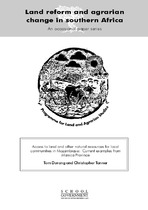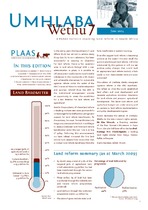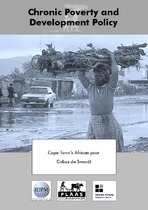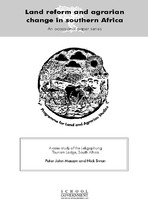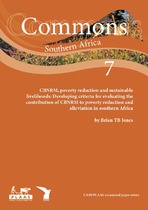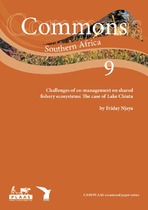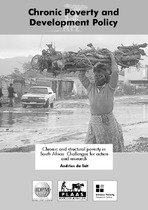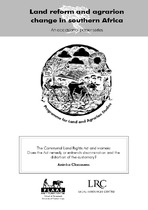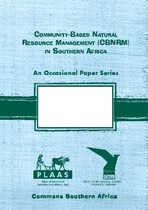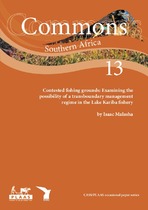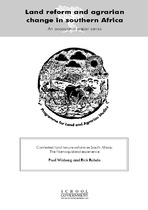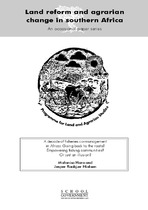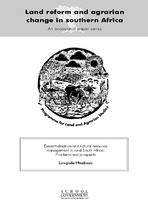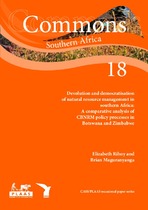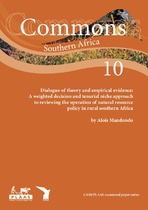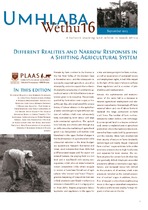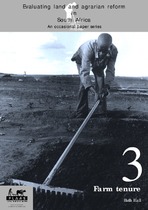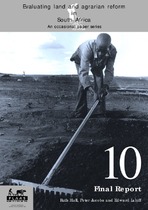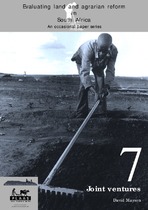Browsing Occasional Papers Series by Title
Now showing items 1-20 of 59
-
Access to land and other natural resources for local communities in Mozambique: Current examples from Manica Province
(Institute for Poverty Land and Agrarian Studies (PLAAS), 2004)Mozambique is still one of the poorest countries in the world. Given that poverty remains overwhelmingly rural in nature, measures to effectively address it should therefore be targeted to the areas where the rural poor ... -
ANC election manifesto in relation to rural development and land reform
(PLAAS, 2009-06)In the last 15 years the Department of Land Affairs (DLA) has set out to achieve many things but, by its own admission, has been unsuccessful in meeting its objectives for land reform. Hence a few questions arise. Is land ... -
Cape Town's African poor
(Institute for Poverty Land and Agrarian Studies (PLAAS), 2004)The typical ‘face of poverty’ in South Africa is no longer that of a rural woman engaged in subsistence agricultural production. Poverty today also refers to the large number of unemployed men who wait daily in vain on ... -
A case-study of the lekgophung tourism lodge, South Africa
(Institute for Poverty Land and Agrarian Studies (PLAAS), 2002)The Lekgophung Lodge is a community-owned wildlife tourism lodge, located in the western part of the Madikwe Game Reserve in the North West Province of South Africa. The Lekgophung community is settled near the western ... -
CBNRM, poverty reduction and sustainable livelihoods: Developing criteria for evaluating the contribution of CBNRM to poverty reduction and alleviation in southern Africa
(Institute for Poverty Land and Agrarian Studies (PLAAS), 2004)This research paper has been prepared as part of the Centre for Social Studies (CASS), University of Zimbabwe/ Programme for Land and Agrarian Studies, University of the Western Cape (PLAAS) programme ‘Breaking New Ground: ... -
Challenges of co-management on shared fishery ecosystems: The case of Lake Chiuta
(Institute for Poverty Land and Agrarian Studies (PLAAS), 2005)Fisheries co-management initiatives have been implemented in various water bodies of southern Africa since the 1990s (Geheb & Sarch 2002). A Participatory Fisheries Management Programme (PFMP) was introduced on Lakes ... -
Chronic and structural poverty in South Africa: Challenges for action and research
(Institute for Poverty Land and Agrarian Studies (PLAAS), 2005)Ten years after liberation, the persistence of poverty is one of the most important and urgent problems facing South Africa. This paper reflects on some of the findings based on research undertaken as part of the participation ... -
Civil society advocacy for an amendment to the KwaZulu-Natal Cemeteries and Crematoria Act
(PLAAS, 2005-11)Welcome to the fourth issue of Umhlaba Wethu, the update on land and agrarian reform in South Africa from the Programme for Land and Agrarian Studies at the University of the Western Cape. With the recent National Land ... -
The Communal Land Rights Act and women: Does the Act remedy or entrench discrimination and the distortion of the customary?
(Institute for Poverty Land and Agrarian Studies (PLAAS), 2005)This paper discusses the likely impact of the Communal Land Rights Act (CLRA) of 2004 on the land rights of rural women. It asks whether the Act is likely to enhance or undermine tenure security, not only for women, but ... -
Constituting the commons in the new South Africa
(Institute for Poverty Land and Agrarian Studies (PLAAS), 2000)This set of papers results from participation by staff members of the Programme for Land and Agrarian Studies in the eighth biennial conference of the International Association for the Study of Common Property, held at ... -
Contested fishing grounds: Examining the possibility of a transboundary management regime in the Lake Kariba fishery
(Institute for Poverty Land and Agrarian Studies (PLAAS), 2005)Community-based natural resources management (CBNRM) programmes in the southern African region emerged as a reaction to colonial ‘fortress’ conservation policies that criminalised and marginalised local people, preventing ... -
Contested land tenure reform in South Africa: The Namaqualand experience
(Institute for Poverty Land and Agrarian Studies (PLAAS), 2004)The legacy of apartheid land policy in South Africa remains one of the most conspicuous manifestations of past injustices. To correct this legacy, diverse land reform efforts have centred on the constitutional mandate for ... -
A decade of fisheries co-management in Africa: Going back to the roots? Empowering fishing communities? Or just an illusion?
(Institute for Poverty Land and Agrarian Studies (PLAAS), 2002)This paper provides an overview of co-management in Africa and the historical, political and paradigmatic reasons for the shift. The historical context is important when analysing the performance of the regime. The main ... -
Decentralisation and natural resource management in rural South Africa: problems and prospects
(Institute for Poverty Land and Agrarian Studies (PLAAS), 2002)In this paper, the issue of decentralisation and natural resource management will be interrogated primarily through a focus on local government reform and land administration. This focus illuminates problems that are on ... -
Devolution and democratisation of natural resource management in southern Africa: A comparative analysis of CBNRM policy processes in Botswana and Zimbabwe
(Institute for Poverty Land and Agrarian Studies (PLAAS), 2007)This paper examines the policy processes of devolution and democratisation of natural resource management as they relate to community-based natural resource management (CBNRM) outcomes in Botswana and Zimbabwe. Devolution ... -
Dialogue of theory and empirical evidence: A weighted decision and tenurial niche approach to reviewing the operation of natural resource policy in rural southern Africa
(Institute for Poverty Land and Agrarian Studies (PLAAS), 2005)Considerable research has been conducted on community-based natural resource management in rural southern Africa. Many interesting insights have accumulated from the literature on the research issues of earlier generations. ... -
Different realities and narrow responses in a shifting agricultural system
(PLAAS, 2013-09)Protests by farm workers in De Doorns in the Hex River Valley of the Western Cape in November 2012 – and the subsequent responses by organised agriculture, as well as attempts by unions to support the workers –illustrate ... -
Evaluating land and agrarian reform in South Africa : Farm tenure
(Institute for Poverty Land and Agrarian Studies (PLAAS), 2003)Farm dwellers are among the poorest South Africans. Most have access to residential land only. A minority has access to grazing land for their livestock or to arable land for cultivation, in return for which they may be ... -
Evaluating land and agrarian reform in South Africa : Final Report
(Institute for Poverty Land and Agrarian Studies (PLAAS), 2003)Land dispossession was a key feature of racism under colonial rule and apartheid in South Africa. More than 3.5 million people were forcibly removed in the period 1960 to 1983 alone, through homeland consolidation, removals ... -
Evaluating land and agrarian reform in South Africa : Joint ventures
(Institute for Poverty Land and Agrarian Studies (PLAAS), 2003)Joint ventures (JVs) are an increasingly common feature of the process of land and agrarian reform in South Africa. They involve black people who currently have land rights or who are land reform beneficiaries and will be ...

